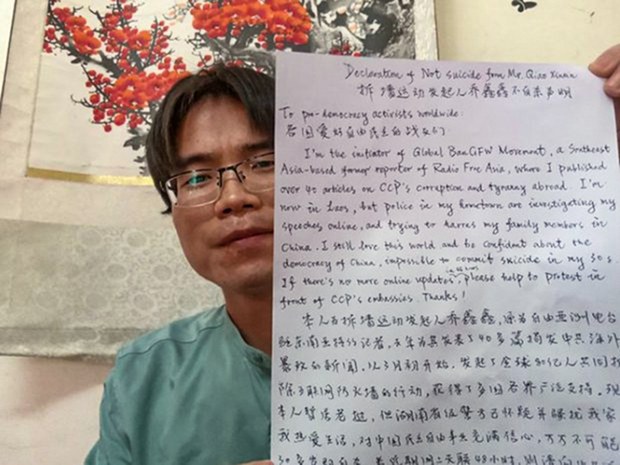Activist Qiao Xinxin arrested for subversion in China after Laos ‘disappearance’
Share

Qiao Xinxin, who launched a campaign to end internet censorship in China, known as the BanGFW Movement, holds a statement in an April 20 Twitter post in which he calls on activists to stage protests outside China’s embassies around the world should he fail to post to his social media accounts for 48 hours.
Chinese authorities have formally arrested free speech activist Qiao Xinxin on suspicion of “subversion of state power” after he called for an end to internet censorship from overseas.
Qiao, whose birth name is Yang Zewei, went missing and is believed to have been detained on or around May 31 from his home in Vientiane, Laos, after launching an online campaign to end internet censorship in China, known as the BanGFW Movement, a reference to the Great Firewall.
He had lived in Laos for several years, and his arrest comes amid growing international concern about China’s cross-border law enforcement operations.
He is currently being held in a juvenile detention center in Hunan’s Hengyang city, and has been charged with “subversion of state power,” Netherlands-based activist Lin Shengliang told Radio Free Asia.
Lin, who is in contact with Qiao’s family, said his case is being handled by a “special investigation team” from Henyang.
“The government has now arrested him on suspicion of subverting state power,” Lin said. “All he did was say some stuff online.”
“He was the initiator of the BanGFW movement, which tried to advocate for the breaking of the [ruling] Chinese Communist Party’s information blockade, allowing the Chinese people to have free access to information,” he said.
Genuine threat
The charge against Qiao suggests Beijing sees him as a genuine threat to the stability of Communist Party rule, he said.
“They claim to have arrested him in Yunnan,” he said, adding that the claim was a move to cover-up the “illegal cross-border arrest” carried out in Laos.
Lin said plainclothes police — likely state security officers — visited Qiao’s family after the news broke that he was being held in Hunan after going missing from Laos.
“They told the family not to give any interviews and not to disclose any information,” he said. “They haven’t been in touch since then.”
Peter Dahlin, founder of the Spain-based rights group Safeguard Defenders, confirmed the report.
“The man detained by Chinese police in Laos and who then disappeared has reappeared in China, in police custody, charged with ‘subversion of State power’,” Dahlin said via his X, formerly known as Twitter, account.
“A surprisingly severe charge,” he added.
According to a June 19 report on Qiao posted to the Safeguard Defenders website: “[Qiao] worked with a small team of exiled Chinese activists and volunteers who lived in Southeast Asia, the US, Canada and the Netherlands to help people inside China circumvent the great firewall and to advocate for China to end its censorship.”
It said the network of activists had published open letters and held a street protest outside the Chinese Consulate in Los Angeles.
Lu detained
Soon after Qiao went missing, police in Laos also detained human rights lawyer Lu Siwei, who will likely face a similar fate, fellow activists and his wife have warned.
Chakra Ip, founder and executive direction of London-based rights group The 29 Principles, said she believes there is no basis on which to extradite Lu to China.
“Lawyer Lu Siwei wasn’t notified of any formal arrest, administrative or criminal detention, or summoned, before he left China,” Ip said. “His Chinese passport is still valid, and his visas to Laos and the United States are legal and valid.”
“This shows that he didn’t break any immigration laws.”
The group called on the Lao government to clarify whether China had submitted a formal extradition request for Lu.
Canada-based Li Jianfeng, a former Chinese judge, told Radio Free Asia earlier this month that 200 Chinese police officers were billeted in a Vientiane hotel, suggesting that cross-border operations are fairly commonplace between China and Laos.
Lu and Qiao’s “disappearances” have sparked international criticism amid ongoing concerns around the Chinese Communist Party’s “long-arm” law enforcement operations, which have included running secret police “service stations” in dozens of countries, according to the Spain-based rights group Safeguard Defenders.
Translated with additional reporting by Luisetta Mudie. Edited by Malcolm Foster.







